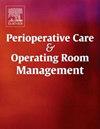The relationship between operating room nurses' comfort and burnout levels: A cross-sectional study
IF 1
Q2 Nursing
Perioperative Care and Operating Room Management
Pub Date : 2025-09-01
DOI:10.1016/j.pcorm.2025.100548
引用次数: 0
Abstract
Background
Nurses' comfort level plays an important role in their ability to perform their professional duties effectively and in supporting their job satisfaction and physical-psychological well-being. Comfort can reduce stress levels and increase a person's ability to cope with challenges in their work or personal life. The study was conducted to determine the relationship between comfort and burnout level of operating room nurses.
Methods
This cross-sectional study was completed with the participation of 115 operating room nurses. Descriptive Characteristics Form, Nurse Comfort Questionnaire and Maslach Burnout Inventory were used to collect the study data.
Results
The burnout level of the nurses was significant and negatively correlated with the total comfort level, sociocultural, psychospiritual and physical comfort. The physical, sociocultural and psychospiritual comfort predicted 49% of the total variance in emotional exhaustion and 18% of the total variance in depersonalization.
Conclusions
As the comfort of the nurses working in the operating room decreased, their burnout levels increased. The nurses' emotional burnout level was significantly and negatively correlated with total comfort level, sociocultural and psychospiritual comfort, and depersonalization level was significantly and negatively correlated with total comfort level, sociocultural, psychospiritual and physical comfort level. In addition, comfort sub-dimensions significantly predicted emotional exhaustion and depersonalization. In order to improve the quality of healthcare services and increase nurses' overall well-being and job satisfaction, it is recommended that future studies focus on intervention-based studies aimed at increasing nurses' comfort.
手术室护士舒适度与职业倦怠的关系:一项横断面研究
护士的舒适程度在他们有效履行专业职责的能力和支持他们的工作满意度和身心健康方面起着重要的作用。舒适可以减轻压力,提高一个人在工作或个人生活中应对挑战的能力。本研究旨在探讨手术室护士的舒适度与职业倦怠水平的关系。方法对115名手术室护士进行横断面研究。采用描述性特征表、护士舒适度问卷和Maslach倦怠量表收集研究数据。结果护士职业倦怠水平与总舒适度、社会文化舒适度、身心舒适度呈显著负相关。身体、社会文化和心理安慰预测了情绪耗竭总方差的49%和人格解体总方差的18%。结论手术室护士的工作舒适度越低,倦怠程度越高。护士情绪倦怠水平与总舒适度、社会文化舒适度、心理精神舒适度呈显著负相关,去人格化水平与总舒适度、社会文化舒适度、心理精神舒适度、身体舒适度呈显著负相关。此外,舒适子维度显著预测情绪耗竭和去人格化。为了提高医疗服务质量,提高护士的整体幸福感和工作满意度,建议未来的研究侧重于以干预为基础的研究,以提高护士的舒适度。
本文章由计算机程序翻译,如有差异,请以英文原文为准。
求助全文
约1分钟内获得全文
求助全文
来源期刊

Perioperative Care and Operating Room Management
Nursing-Medical and Surgical Nursing
CiteScore
1.30
自引率
0.00%
发文量
52
审稿时长
56 days
期刊介绍:
The objective of this new online journal is to serve as a multidisciplinary, peer-reviewed source of information related to the administrative, economic, operational, safety, and quality aspects of the ambulatory and in-patient operating room and interventional procedural processes. The journal will provide high-quality information and research findings on operational and system-based approaches to ensure safe, coordinated, and high-value periprocedural care. With the current focus on value in health care it is essential that there is a venue for researchers to publish articles on quality improvement process initiatives, process flow modeling, information management, efficient design, cost improvement, use of novel technologies, and management.
 求助内容:
求助内容: 应助结果提醒方式:
应助结果提醒方式:


